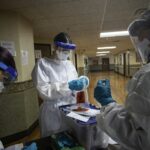New Measles Case Detected in Lea: Health Officials Urge Vigilance
In a time where public health has become paramount, the importance of staying vigilant about contagious diseases cannot be overstated. Recently, Lea County health authorities reported a confirmed case of measles, prompting immediate action and heightened awareness across the community. With measles being highly transmissible, the detection of this case underscores the urgency for residents to remain informed and proactive.
Below, we’ll break down key details about the measles situation, explore potential risks, and provide essential guidance to help safeguard you and your loved ones.
Understanding the Recent Measles Case in Lea County
Health officials confirmed the addition of one measles case in Lea County, which has placed the area on high alert for additional possible infections. According to early reports, any new measles diagnosis triggers an immediate epidemiological investigation and prompts health agencies to assess the situation thoroughly. Given measles’ highly contagious nature, even one confirmed case is considered a significant health event that calls for accelerated prevention measures and increased alertness from residents and healthcare providers alike.
Although the source and exact circumstances leading up to this new infection have not yet been publicly detailed, health officials in Lea County emphasize the importance of recognizing measles’ symptoms and acting fast should communities experience more cases.
Why Measles Shouldn’t Be Underestimated
Measles is not just your average virus – it is one of the most contagious diseases known to medicine. It spreads easily through airborne droplets from coughs, sneezes, and even normal conversations. The measles virus stays alive in air and on surfaces for a longer period, facilitating its transmission from infected individuals to others who might not have immunity to the virus.
The severity of measles should not be underestimated, as complications from this disease can include:
- Pneumonia: A potentially fatal lung infection caused by measles complications.
- Brain inflammation (encephalitis): In some severe cases, measles can lead to swelling around the brain, potentially causing irreversible neurological damage.
- Hospitalization and death: Although rare, measles can be fatal, especially among young children, pregnant women, and those with weakened immune systems.
Because of these complications, health professionals nationwide continuously advocate for vigilance and prevention against measles outbreaks.
Spotting the Symptoms Early
Knowing what early symptoms to look out for can make a significant difference in the outcomes related to measles exposure. Health officials urge the public to pay close attention to symptoms such as:
- High fever: Temperatures can spike rapidly, sometimes reaching over 104°F.
- Dry cough: A persistent, dry cough is a common initial symptom in infected individuals.
- Sore throat: Often accompanied by discomfort and difficulty swallowing.
- Runny nose: Similar to common cold symptoms but often much more severe.
- Watery, inflamed eyes (conjunctivitis): Eyes become irritated and sensitive to light.
- Skin rash: Usually starting from the face and neck area before spreading downwards. Typically appears 3 to 5 days after other symptoms start.
Identifying symptoms promptly and alerting medical professionals can dramatically reduce further transmission and allow for swift management of the disease.
Steps You Can Take to Protect Yourself and Your Family
Though measles can have severe implications, simple action steps can greatly reduce your risks and help ensure community safety:
Get Vaccinated
The Centers for Disease Control and Prevention (CDC) consistently recommends that individuals ensure they are fully vaccinated with the measles-mumps-rubella (MMR) vaccine. The MMR vaccine has demonstrated a high success rate in preventing measles infection, drastically reducing severe complications. Adults should verify their vaccination status, and parents must consult healthcare providers regarding their children’s immunization plans.
Practice Good Hygiene
Maintaining effective hygiene practices is essential to reduce disease transmission. These include:
- Regularly washing hands for a minimum of 20 seconds.
- Using alcohol-based hand sanitizer when soap and water are unavailable.
- Avoiding touching eyes, nose, and mouth with unwashed hands.
- Avoiding sharing utensils, drinks, or personal items that could transmit saliva.
Seek Medical Attention if Symptoms Appear
If you or a loved one experiences measles-related symptoms, medical professionals recommend contacting a healthcare provider immediately. It’s essential to call ahead before going to any clinic or emergency room, as preparations can be made to reduce exposure risk







